Watchdogs of Petland
Student journalists cover the investigation of retail-style pet stores
Frisco Petland protestor stands outside the location on their busiest day with a sign that reads “Sick & Dead Pets at Frisco Petland.” In the following article, journalists and seniors Grant Johnson and Khshaeta Cama cover the investigation of the Frisco location.
January 28, 2021
85 percent of American households owned a dog in 2020.
These pets love attention, being surrounded by people and keeping their owners company. According to the Humane Society, nine percent of those families who have a dog purchased it from a pet store. Instead of finding a breeder or adopting from a shelter, families tend to shop at establishments set up like a department store with products surrounded by glass, bright lights and a place to “try it out.” This retail-model would ensure healthy pets from reputable breeders
Lena’s Story: Love…and Hesitation at First Sight
Frisco resident Lena Amoni found herself lonely during the pandemic and took a trip to Petland, located off Preston Road, to search for her new companion. Amoni filled out an extensive contract, swiped her card to pay the $7,000 and got to take home her small, 11-pound ball of joy she later named “Peanut.”
Before leaving the store, Petland clerks informed her that Peanut had thrown up weeks earlier and explained his eating habits.
With an employee citing the incident as “no big deal,” Amoni enlisted her trust in the store because she believed they were the experts, especially after being in business in Frisco for over 20 years. It was too late to back away; she was in love with Peanut and knew that he would be a great addition to her life.
Her troubles began when she took him home. He started throwing up, so she took him to the vet three days after her purchase. The Family Pet Center is the veterinarian facility that Petland customers must receive care from if they want any compensation for potential medical bills. This was just the beginning of Amoni’s nightmare. With Lena being a first-time pet owner, one of the things she failed to do was research. She trusted every word that the “experts” at Petland told her.
The United States Humane Society Investigation
After spending summer of 2019 at the Frisco Petland location, a United States Humane Society investigator revealed results from an undercover investigation to the public in September.
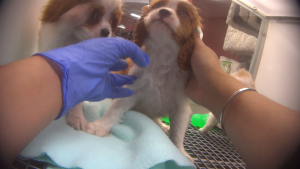
Citations were issued after the investigation exposed the facility for animal mistreatment. Employees placed an injured rabbit in a box instead of taking it to the veterinarian, puppies were underweight, ribs were visible through their skin, pets lived in overcrowded cages, and animals were force-fed.
“What happens if he does not get better?” the undercover investigator asked a fellow employee when dealing with an injured rabbit.
“They freeze them” was the response.
After a year and a half, the Petland in Frisco is still open and selling dogs that they claim to be healthy. Several violations were issued after being caught with animal cruelty, an unsafe environment, and an unsanitized area.
Nothing has changed.
The Ordinance
Following the investigation from the USHS, animal rights group “Texans Exposing Petland” petitioned for the city to ban the sales of puppies in a retail setting. They fought for a ban similar to those issued in San Antonio, Austin and El Paso but did not receive what they wanted. Instead, the City of Frisco issued an ordinance that allowed Petland to stay open as long as they followed the ordinance rules.
“The ordinance does not require the city to find violations when they encounter a paperwork lapse,” lawyer Rebecca Whitehouse said. “It gives them the option to do that, but it does not require an in-store violation. The mechanism that the city put in the ordinance is not gonna fix the problem.”
Activists believe that the ordinance avoids the root of the problem. The dogs were coming from out-of-state breeders known as “puppy mills.”
The Bigger Issue
“Puppy mills,” a term that most pet owners are familiar with, is rarely associated with a facility that has 5-star reviews and a clean salesfloor.
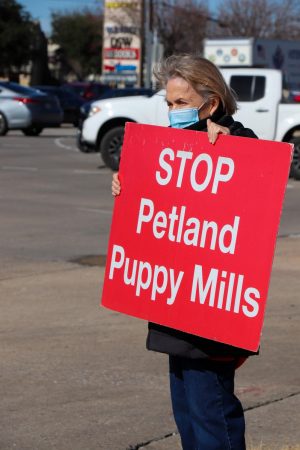
The Humane Society of the United States (HSUS) defines puppy mills as dog-breeding operations that put profit above dogs’ welfare. The Animal Welfare Act is the legislation that keeps these facilities in check but ultimately leaves it up to local communities to determine their regulations.
Since the United States Department of Agriculture, who enforces the AWA, allows these facilities to continue their operation, local communities have to enact legislation to prevent puppy mills from selling these dogs in their area. While the City of Frisco cannot stop the sales of puppies from these mills, they can stop these sales in their city.
Petland still sells sick dogs from “puppy mills,” and only those who buy one, know what the effects are.
Susie’s Story: A Cloud of Lies
In late April, Frisco resident Susie Seymour was interested in buying Logan, a hypo-allergenic, white Maltese. Petland told her that Logan was part of a unique, selective breeding process.
“It was a complete lie,” Seymour said after about nine months.
Spending about seven thousand dollars, Susie and her family purchased Logan and instantly noticed his nose running. The sales clerk informed her it was just allergies, and the family took their word for it, until the next day when the puppy began to throw up.

The story starts the same for every victim.
They fall in love with the dog. The dog is sick, and Petland makes an excuse.
First Time Pet Owners In The Dark
Texas is a booming state with thousands of people moving to Collin County every month. Some of those families moving are willing to go anywhere to complete their family with a furry friend. Every day, new families pay an exorbitant amount of money to get their pet, only then to realize how Petland has handled their new addition
“At the end of the day, I do not think the store is going to walk away from this business voluntarily,” Whitehouse said. “I think it is going to come to the city having to step in and say they do not want this anymore.”
Whitehouse has fought to create a change in pet sales legislation in Frisco for years now.
“I think our city is terrified of being perceived as unfriendly business,” she said. “What they want to do, especially with this ordinance, is have their cake and eat it too. Show the public they’re doing something, but they don’t want to make any requirements that are too ownerniss so that they could never be accused of being unfriendly to businesses.”
But at what cost?
Seymour began to panic as Logan became ill and took him to the Family Pet Center. Dr. Steven Flowers took a look at Logan’s stomach ache.
Nothing was right.
Flowers diagnosed him with giardia and upper respiratory infection. The doctor gave Seymour the antibiotics and expected Logan to get better a few days later. This was not the case.
A few days passed, and Seymour, as well several other members of her family, began to feel sick. What they thought might be COVID-19, turned out to be Logan’s infection which they had contracted. Unable to handle the stress of pet ownership, Seymour turned to the place with all the answers: Google.
Petland’s website seemed efficient with good reviews, but as she began to do more digging, she saw the horror stories of Petland.
After reading stories of puppy mills and abuse, she made the decision to surrender Logan instead of making Petland take him back, which could lead to more harm.
Lena Amoni, on the other hand, took her battle to the store after researching everything they had done.
Lena vs. the Landlord
Four months after purchasing Peanut, he was unable to walk correctly. He then stopped eating and began to throw up constantly.
Amoni took Peanut straight to the ER, where they began to run tests to determine what was wrong with him. That is when she discovered he had a liver shunt.
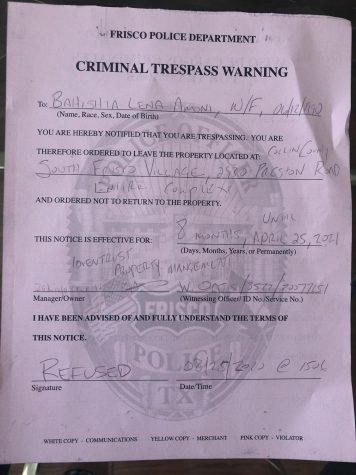
The ER vet recommended that she put him down, but all she wanted to know was how she could save him.
When Amoni asked for vet bill coverage, Petland informed her that his visits were not covered because he did not visit the doctor in the contract. She took him back to the Family Pet Center where Dr. Flowers cited black mold as his cause of sickness and said that there were no liver problems.
Amoni then took Peanut to a specialist.
Eight thousand dollars later, the only option to save Peanut was surgery. She then took Peanut to Petland and begged for help.
“The manager treated me like s**t,” Amoni said. “He called the cops on me. He said, ‘We could only give you three thousand. We cannot help the puppy.’”
After police arrived and Amoni was kicked out, the landlord of Petland placed a restraining order against her until April 2021.
After spending close to $20,000 on Peanut, he was able to fight through his health complications. Peanut still suffers from several issues and eats special food.
The Fight Continues
Texans Exposing Petland, the group that fought for a ban on the “retail” sales of dogs in Frisco, presented statistics, research and resources so the city could make an informed decision on the matter.
Their fight did not end after the ordinance. The group spends every Saturday afternoon on Gaylord Parkway’s sidewalks. During Petland’s busiest day, the advocates share the stories of victims like Amoni and Seymour in hopes of deterring potential buyers.
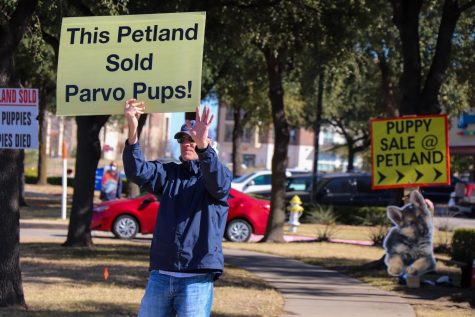
Their temporary goal is awareness. Their final goal is a ban.
People have an immense impact on what happens in the dog retail world. You have the voice to cause change and make a difference in the community to help people not go through what Amoni and Seymour went through.
Only you can make that change.


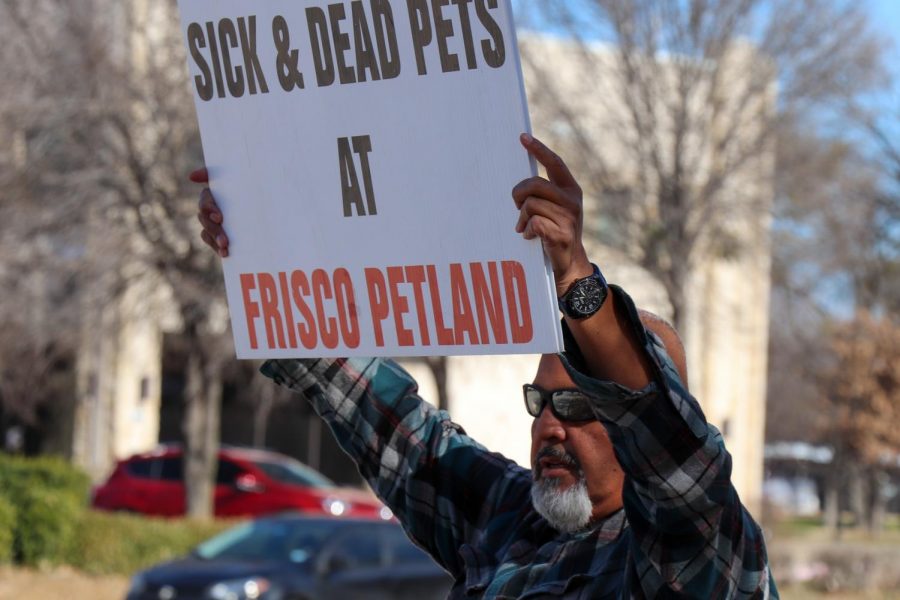


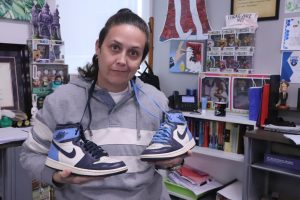




Cathy Commack
Feb 16, 2022 at 3:49 pm
I live in Fenton, Missouri, which is a suburb of St. Louis. I found your article about Petland online. I am writing to let you know that your work is helping others throughout the country who are fighting for animal rights legislation.
Residents of Fenton as well as the St. Louis metropolitan area are currently working hard to prevent the opening of a Petland in our community.
I shared this excellent article on Facebook, and other local online sites. The response has been great.
Thank you for such a well written, comprehensive and informative piece.
Cathy Commack
RODOLFO GALLARDO
Apr 18, 2021 at 7:30 am
Brilliant Grant and Khshaeta!!! Excellent story. Thanks for bringing awareness on this cruel practice done by Petland.
Susan Oakey
Feb 14, 2021 at 8:05 pm
Thanks for covering Petland – Frisco’s little shop of horrors! You are so right – only by shining a light on the puppy mill trade can we stop the retail sale of companion animals, and ensure that others don’t suffer like Logan, Peanut, and their families.
Cile and Ben HollowAy
Feb 14, 2021 at 12:14 pm
Outstanding coverage! Thankyou! Very professional.